irregular verbs พร้อม-คํา-แปล: นี่คือโพสต์ที่เกี่ยวข้องกับหัวข้อนี้
สวัสดีค่ะน้องๆ ชาว
Dek-D.com
แม้ปกติ
พี่พิซซ่า
จะสนับสนุนให้ทุกคนเรียนภาษาอังกฤษด้วยความเข้าใจเป็นหลัก แต่ก็ปฏิเสธไม่ได้ว่ามันก็มีคำศัพท์ที่จะต้องท่องกันอยู่ด้วย (แต่ถ้าใครถนัดใช้ซ้ำๆ ให้จำได้เองอัตโนมัติก็โอเคนะ) หนึ่งในเซ็ตศัพท์ที่ต้องท่องจำกันบ่อยๆ ก็คือกลุ่ม phrasal verbs นั่นเอง วันนี้พี่เลยมีกลุ่มศัพท์ phrasal verbs ที่ออกสอบบ่อยอีกกลุ่มหนึ่งมาฝากค่ะ
Table of Contents
phrasal verbs คืออะไร
phrasal verbs
คือคำกริยาที่มี 2 ส่วน คือส่วนกริยาหลักหรือเรียกง่ายๆ ว่าเวิร์บหลัก กับส่วนหลังที่เรียกว่า particle ค่ะ (พาร์ทิเคิล) เมื่อเวิร์บหลักเจอกับพาร์ทิเคิลมันก็จะเกิดเป็นความหมายใหม่ เช่น
count
ปกติเป็นคำกริยาที่แปลว่า “นับ”
แต่พอเติมพาร์ทิเคิลข้างหลังว่า on เข้าไป
คำว่า
count on
ก็จะกลายเป็นความหมายใหม่ที่แปลว่า “พึ่งพาได้, ไว้วางใจได้”
I know that I can always count on you. ฉันรู้ว่าฉันสามารถพึ่งเธอได้เสมอ
jazz
ปกติถ้าเป็นคำกริยาก็หมายถึง “เล่นเพลงสไตล์แจ๊ซ”
แต่พอเติมพาร์ทิเคิลข้างหลังว่า up เข้าไป
คำว่า
jazz up
ก็จะกลายเป็นความหมายใหม่ที่แปลว่า “ทำให้น่าสนใจขึ้น”
Let’s jazz up this room with neon curtains. มาทำให้ห้องนี้น่าสนใจขึ้นด้วยผ้าม่านสีนีออนกันเถอะ

ตำแหน่งการวาง phrasal verbs
มองเผินๆ ก็เหมือนจะง่ายนะคะ เพราะก็คือเขียนเรียงๆ กันไปเลยนั่นแหละ ขึ้นด้วยกริยาก่อน แล้วค่อยตามด้วยพาร์ทิเคิล แต่พอมีกรรม (object) เพิ่มเข้ามาก็เริ่มจะเกิดปัญหาแล้วว่าจะเอากรรมวางตรงไหน จะวางไว้ตรงกลางอยู่ใน phrasal verbs เลย หรือจะเขียน phrasal verbs ติดกันแล้วเอากรรมวางไว้หลังพาร์ทิเคิลดีล่ะ
จริงๆ phrasal verbs ส่วนมากจะมีแพทเทิร์นเดียวมาเลย เช่น
count on
ก็มีแพทเทิร์นเดียว คือเขียน
count on ติดกันแล้วค่อยต่อท้ายด้วย you
จะเอา you ไปแทรกตรงกลางระหว่าง count กับ on ไม่ได้ ถามว่าต้องท่องเลยมั้ยว่ามี phrasal verbs ไหนบ้างที่มาแพทเทิร์นนี้อย่างเดียว จริงๆ แค่อ่านเยอะๆ ฟังเยอะๆ ก็คุ้นเองแล้วค่ะ เปิดคลื่นวิทยุที่เปิดเพลงภาษาอังกฤษวันเดียวก็จะได้ยินแต่ count on you, count on me, count on him วนๆ อยู่ประมาณนี้ แค่นี้เราก็ชินไปเองแล้วว่า count on มันมีแพทเทิร์นของมันแค่แบบนี้อย่างเดียว
หรืออย่าง
count in
ที่แปลว่า “รวม(ใคร)เข้าไปในแผนการด้วย” phrasal verbs นี้ก็ได้ยินในภาพยนตร์บ่อยๆ เช่นในหนังวัยรุ่น จะมีตัวละครนึงพูดขึ้นมาว่าจะมีงานปาร์ตี้ที่บ้านใครซักคน ตัวเอกก็อาจจะตอบว่า Count me in! หรือจะคือ “ฉันไปด้วย” หรือถ้าเป็นหนังวางแผนปล้น พอตัวละครที่วางแผนอธิบายเสร็จว่าจะมีตำแหน่งอะไรบ้าง อีกคนก็อาจจะตอบว่า Count me in! เพื่อสื่อว่า “ฉันเอาด้วย” ก็ได้ค่ะ เจอแบบนี้เข้าบ่อยๆ ก็จะคุ้นเคยเองว่า count in มันมี
แพทเทิร์นคือ count ……. in
(และก็จะรู้ด้วยว่าในช่องว่างนั้นก็เป็นคนเสมอ ไม่ใช่สิ่งของ)

***แต่***
แต่ก็ไม่ใช่ว่า phrasal verbs ทุกตัวจะตรงๆ แบบ count on กับ count in ที่เขียนได้อยู่แบบเดียวค่ะ มีหลายตัวที่จะวางกรรมคั่นตรงกลางหรือวางไว้ข้างหลังทีเดียวเลยก็ได้ เช่น
turn off
ที่แปลว่า “ปิด” เราจะบอกว่า
turn off the TV หรือ turn the TV off ก็ได้
ถูกเหมือนกันทั้งคู่ ความหมายเดียวกันทั้งคู่ หรือคำว่า
knock over
ที่แปลว่า “ทำให้ล้มลงไป” จะเขียนว่า
knock over the vase หรือ knock the vase over ก็ได้
ก็แปลว่าทำให้แจกันล้มเหมือนกันอยู่ดีค่ะ ชอบแบบไหน รู้สึกว่าแบบไหนที่เป็นธรรมชาติสำหรับตัวเรามากกว่าก็เลือกเรียงลำดับคำไปแบบนั้นได้เลย
แต่… (ยังมีอีกแต่นึงนะ)
มีอยู่กรณีนึงที่เราจะต้องเอากรรมไว้ตรงกลาง
ให้มันอยู่ข้างใน phrasal verbs เท่านั้นค่ะ นั่นคือเมื่อกรรมนั้นเป็น personal pronoun นั่นเอง
personal pronoun
คือสรรพนามแทนบุคคลค่ะ (ลืมไปรึยัง 555) ซึ่งสรรพนามแทนบุคคลที่ทำหน้าที่เป็นกรรมก็ได้แก่
me, you, him, her, us, them, it
ฉะนั้นถ้าเจอ 7 ตัวนี้เป็นกรรมของ phrasal verbs ก็ต้องเอา 7 ตัวนี้ไปไว้แทรกกลางใน phrasal verbs ตัวนั้นนะคะ เช่น
turn it off
และ
knock it over
ไม่งงเนอะ

รวมฮิต phrasal verbs ออกสอบบ่อย
break
break down
พัง (จะรถพังหรืออารมณ์พังแบบปล่อยโอลั่นเลยก็ได้)
My car broke down this morning. รถฉันพังเมื่อเช้า
She broke down in tears. เธอร้องไห้ออกมาลั่น (อารมณ์แบบควบคุมไม่ไหวแล้ว)
break in
บุกรุกเข้าไปในอาคาร
The bad guys tried to break in. พวกคนไม่ดีพยายามบุกเข้ามา
break off
ยุติ, ทำให้แยกออกจากกัน, หยุดพูดกระทันหัน
Let’s break off for a while and have some coffee. เราหยุดเรื่องนี้กันซักพักแล้วไปกินกาแฟกันเถอะ
He broke off his speech when he remembered that she was waiting for him. เขาหยุดพูดไปเฉยๆ เมื่อจำได้ว่าเธอกำลังรอเขาอยู่
break out
พังออกไป, อยู่ๆ ก็เริ่มทันที
War may break out at any moment. สงครามจะเริ่มเมื่อไหร่ก็ได้ตอนนี้
A prisoner broke out of his cell. นักโทษหนีออกมาจากห้องขัง
break up
เลิกรา, แตกกลุ่ม, ทำให้แหลก, อยู่ๆ ก็หัวเราะออกมาแบบคุมไม่ได้
She was heartbroken when we broke up. เธอหัวใจสลายตอนที่เราเลิกกัน
The meeting broke up at 5. การประชุมเลิกตอน 5 โมง
bring
bring about
เป็นสาเหตุของ, ทำให้เกิด
Tornados bring about damage every year. ทอร์นาโดทำให้เกิดความเสียหายทุกปี
bring up
เลี้ยงดู, ให้การศึกษา, พูดถึง
I will bring up my kid as my mother did me. ฉันจะเลี้ยงลูกให้เหมือนกับที่แม่เลี้ยงฉันมา
Don’t bring up the fight again. อย่าพูดถึงเรื่องที่ทะเลาะกันอีกนะ
call
call for
เรียกหา, เรียกร้อง, จำเป็นต้องได้
This condition calls for urgent medical attention at any time. อาการนี้จำเป็นต้องได้รับการดูแลทางแพทย์อย่างเร่งด่วนเมื่อใดก็ได้
call off
ยกเลิก
She called off the meeting. เธอยกเลิกการประชุม
call out
เรียกชื่อเสียงดังๆ, สั่งให้คนมาช่วย
Please call out my name during your live session. ได้โปรดเรียกชื่อฉันออกมาด้วยตอนที่คุณไลฟ์สด

carry
carry on
ทำต่อไป
You must carry on your studies. เธอต้องศึกษาเล่าเรียนต่อไปนะ
carry out
ทำให้สำเร็จลุล่วง
You should carry out this plan. เธอควรทำแผนนี้ให้เรียบร้อยนะ
come
come across
เจอโดยบังเอิญ
I come across this book in a bookstore around the corner. ฉันบังเอิญเจอหนังสือเล่มนี้ในร้านหนังสือแถวหัวมุมถนน
come by
เยี่ยมเยียน, ไปมาหาสู่
She came by the house and appeared to be pregnant. เธอแวะมาเยี่ยมที่บ้านและดูเหมือนว่าเธอจะท้อง
come off
หลุดร่วง
Use this oil and the paint will come off. ใช้น้ำมันนี้แล้วสีก็จะหลุดออกมา
come up
เกิดขึ้นมาในใจ, คิดขึ้นมาได้
He came up with an excellent idea. เขาคิดอะไรดีๆ ขึ้นมาได้
fall
fall behind
ตามหลังอยู่
Our students are falling behind global peers in math. นักเรียนของเราตามหลังนักเรียนจากทั่วโลกในวิชาคณิตศาสตร์
fall for
ตกหลุมรัก, ตกหลุมพราง
Don’t fall for his sugar-coated words. อย่าไปตกหลุมคำหวานของเขาล่ะ
get
get along
เข้ากันได้ดี
My sisters can’t get along with each other. พวกพี่สาวของฉันเข้ากันไม่ได้
get away
ปลีกตัวออกไป, รอดไปได้
The robbers got away with $30 million cash. พวกโจรหนีไปได้พร้อมเงินสด 30 ล้านดอลลาร์
get off
ลงจากรถไฟ, รถเมล์, เรือ, เครื่องบิน ตรงข้ามกับ
get on
ที่แปลว่าขึ้นไปบนยานพาหนะนั้นๆ
Get on at St Paul’s Cathedral and get off at Buckingham Palace. ขึ้นรถที่วิหารเซนต์พอลแล้วลงรถที่พระราชวังบัคกิงแฮม
get in
ขึ้นรถยนต์, รถแท็กซี่ ตรงข้ามกับ
get out
ที่แปลว่าลงจากพาหนะนั้นๆ
Get in the car now! ขึ้นรถเดี๋ยวนี้!
Let’s get out of the taxi. ลงจากแท็กซี่กันเถอะ

go
go against
ขัดแย้งกับ
Do not go against the rule. ห้ามขัดแย้งกับกฎนะ
go off
ระเบิด, (นาฬิกาปลุก) ดัง, (ไฟฟ้า) ดับ, (อาหาร) บูด
We heard the bomb go off. พวกเราได้ยินเสียงระเบิดระเบิด
The alarm just went off. สัญญาณเตือนดังขึ้นมา
go over
ตรวจตรา, ตรวจสอบความความถูกต้อง
We have to go over this project carefully. เราต้องตรวจสอบโครงการนี้อย่างระมัดระวัง
keep
keep off
ออกห่าง, หลีกเลี่ยง, ละเว้น
The sign said ‘keep off the grass.’ ป้ายเขียนว่าห้ามเดินลัดสนาม
This net here is to keep off mosquitoes. มุ้งนี้มีไว้กันยุง
keep on
ทำต่อไป
If you keep on smoking like that, you’ll die soon. ถ้าเธอยังสูบบุหรี่แบบนี้ต่อไป เธอจะตายในเร็วๆ นี้
keep up
with ตามให้ทัน
You need to keep up with me. เธอจำเป็นต้องตามฉันให้ทัน
look
look after
ดูแล
I’ll look after your kids. ฉันจะดูแลลูกๆ เธอให้
look down on
ดูถูก
You should never look down on people. เธออย่าได้ดูถูกคนอื่น
look forward to
ตั้งตารอคอยอย่างใจจดใจจ่อ
I look forward to seeing you. ฉันตั้งตารอคอยที่จะได้พบเธอ
look up to
ชื่นชม, เคารพนับถือ
Many students look up to Miss Watson. นักเรียนหลายคนนับถือคุณครูวัตสัน

put
put on
สวมใส่, เพิ่ม (น้ำหนัก)
Put on your coat before you go outside. สวมเสื้อคลุมก่อนออกไปนะ
I’ve put on a lot of weight since Songkran. ฉันน้ำหนักขึ้นเยอะมากตั้งแต่สงกรานต์
put out
ดับ (ไฟ)
Be sure to put out the fire before you leave. ดูให้แน่ใจว่าคุณดับไฟเรียบร้อยก่อนออกไป
put up with
ยอมทน
I will not put up with an insult like that. ฉันจะไม่ทนกับคำด่าแบบนั้น
run
run into
บังเอิญเจอกัน
I ran into Tom again yesterday. เมื่อวานฉันบังเอิญเจอกับทอมอีกแล้ว
run out of
หมดแล้ว, ไม่มีสำรอง
We have run out of sugar and milk. น้ำตาลกับนมเราหมดแล้ว
ทั้งหมดนี้เป็น phrasal verbs ที่เจอบ่อยมากในข้อสอบวัดระดับ แต่จริงๆ ยังมี phrasal verbs อีกมากมายเลยค่ะ ถ้ามีโอกาสพี่ก็จะเขียนบทความแนะนำ phrasal verbs ทีละกลุ่มคำอีก เหมือนที่เคยเขียนแนะนำ phrasal verbs ตระกูล
turn
ที่ www.dek-d.com/studyabroad/32369/ ไว้ค่ะ (ตระกูล turn ก็ออกสอบบ่อยมากเช่นกัน)
อ้างอิง
dictionary.cambridge.org
en.oxforddictionaries.com
[Update] คำศัพท์ภาษาอังกฤษ กริยาวลี Phrasal Verbs และสำนวน Idioms | irregular verbs พร้อม-คํา-แปล – NATAVIGUIDES
advertisements
เรียนภาษาอังกฤษออนไลน์ คำศัพท์ภาษาอังกฤษ กริยาวลี Phrasal Verbs และสำนวน Idioms
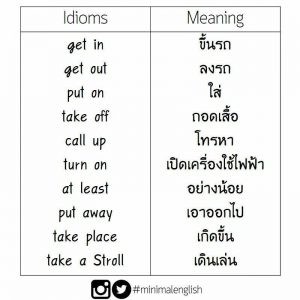
get in = ขึ้นรถ
get out = ลงรถ
put on = ใส่
take off = ถอดเสื้อ
call up = โทรหา
turn on = เปิดเครื่องใช้ไฟฟ้า
at lest = อย่างน้อย
put away = เอาออกไป
take place = เกิดขึ้น
take a stroll = เดินเล่น
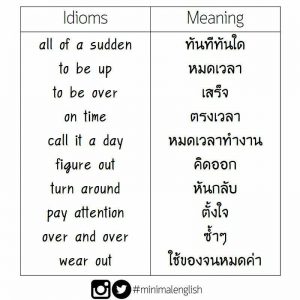
all of a sudden = ทันทีทันใด
to be up = หมดเวลา
to be over = เสร็จ
on time = ตรงเวลา
call it a day = หมดเวลาทำงาน
figure out = คิดออก
turn around = หันกลับ
pay attention = ตั้งใจ
over and over = ซ้ำๆ
wear out = ใช้ของจนหมดค่า, ทำให้ (ใคร) เหน็ดเหนื่อยเป็นอย่างมาก, ใช้หรือทำให้ (อะไร) เสียหายหรือชำรุดจนใช้การไม่ได้
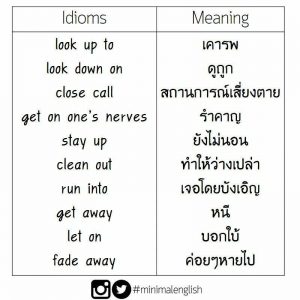
look up to = เคารพ
look down on = ดูถูก
close call = สถานการณ์เสี่ยงตาย
get on ones’ nerves = รำคาญ
stay up = ยังไม่นอน
clean out = ทำให้ว่างเปล่า
run into = เจอโดยบังเอิญ
get away = หนี
let on = บอกใบ้
fade away = ค่อยๆ หายไป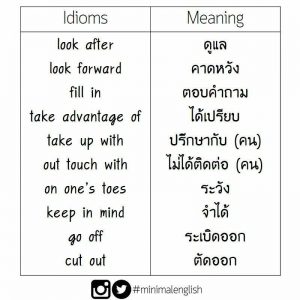
lood after = ดูแล
look forward = คาดหวัง
fill in = ตอบคำถาม
take advantage of = ได้เปรียบ
take up with = ปรึกษากับ (คน)
out touch with = ไม่ได้ติดต่อ (คน)
on one’s toes = ระวัง
keep in mind = จำได้
go off = ระเบิดออก
cut out = ตัดออก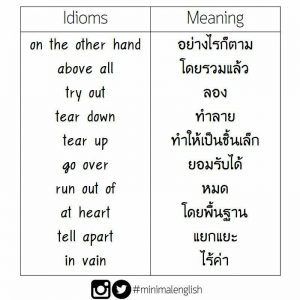
on the other hand = อย่างไรก็ตาม
above all = โดยรวมแล้ว
try out = ลอง
tear down = ทำลาย
tear up = ทำให้เป็นชิ้นเล็ก
go over = ยอมรับได้
run out of = หมด
at heart = โดยพื้นฐาน
tell apart = แยกแยะ
in vain = ไร้ค่า
advertisements
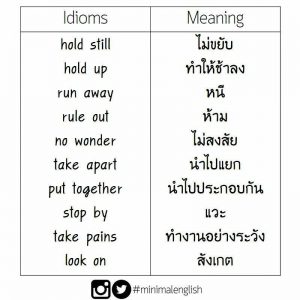
hold still =ไม่ขยับ
hold up = ทำให้ช้าลง
run away = หนี
rule out = ห้าม
no wonder = ไม่สงสัย
take apart = นำไปแยก
put together = นำไปประกอบกัน
stop by = แวะ
take pains = ทำอย่างระวัง
look on = สังเกต
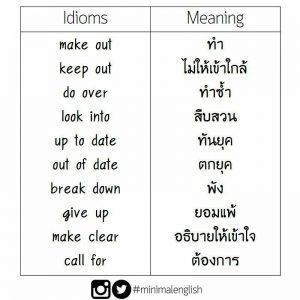
make out = ทำ
keep out = ไม่ให้เข้าใกล้
do over = ทำซ้ำ
look into = สืบสวน
up to date = ทันยุค
out of date = ตกยุค
brake down = พัง
give up = ยอมแพ้
make clear = อธิบายให้เข้าใน
call for = ต้องการ
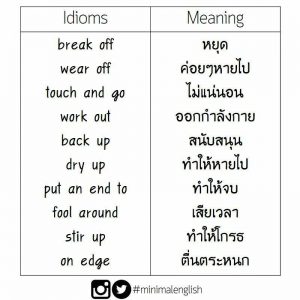
break off = หยุด
ware off = ค่อยๆ หายไป
touch and go = ไม่แน่นอน
work out = ออกกำลังกาย
back up = สนับสนุน
dry up = ทำให้หายไป
put an end to = ทำให้จบ
fool around = เสียเวลา
stir up = ทำให้โกรธ
on edge = ตื่นตระหนก
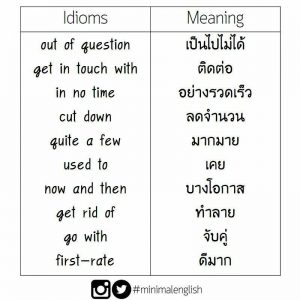
out of question = เป็นไปไม่ได้
get in touch with = ติดต่อ
in on time = อย่างรวดเร็ว
cut down = ลดจำนวน
quite a few = มากมาย
use to = เคย
now and then = บางโอกาส
get rid of = ทำลาย
go with = จับคู่
fist-rate = ดีมาก
_________
die out (phr. v.) = หายไป, สูญพันธุ์
เช่น
Some traditional customs are beginning to die out each decade.
Dinosaurs died out millions of years ago.
run out (phr. v.) สามารถใช้ได้ 2 แบบ คือทั้ง Transitive verb และ Intransitive verb ค่ะ
• Transitive verb นำไปใช้ได้เลย ไม่ต้องมีกรรมมารองรับ = ใช้จนหมด (ไม่มีเหลือ), หมด (เวลา/อายุ)
เช่น
His patience has run out.
My passport has just run out.
• Intransitive verb เมื่อนำมาใช้ต้องตามด้วย of เป็น run out + of = ใช้หรือขายไปจนหมด จนไม่มีเหลือเลย ส่วนใหญ่ใช้กับ food/ money/ ideas/ patience.
เช่น
Shopkeeper: Sorry, we’ve run out of milk.
I’m running out of patience.
make out (phr. v.) กริยาคำนี้นะคะ มีความหมายอยู่ 2 จำพวกใหญ่ๆ ด้วยกัน คือ formal และ informal
ความหมายในแบบ formal มีรูปแบบการใช้ดังนี้ค่ะ
• make (sth./s.b.) out = เข้าใจ, มองเห็นชัดเจน
เช่น
The letters are too small. I can’t make them out at all.
I can’t make out your presentation.
• make (sth.) out = เขียน
I made a cheque out for my daughter.
ส่วนความหมายแบบ informal จะใช้แบบนี้ค่ะ
• make out (sth.) = อ้าง, กล่าวอ้างถึงความถูกต้องของสิ่งใดสิ่งหนึ่ง
เช่น Jim made out (that) he had just dated with a celebrity.
• make out = ประสบความสำเร็จ
เช่น How does she make out in her new job?
• make out = มีความสัมพันธ์ทางเพศ (ความหมายนี้แอบอีโรติกนิดส์นึงนะคะ)
เช่น He’s not a good guy. He’s just only interested in making out with girls.
bring out (phr. v.)
• bring (s.b.) out = ทำให้มั่นใจ
เช่น He’s too shy to speak. I need to find ways to bring him out.
• bring (sth.) out = ผลิต
เช่น Apple Computer, Inc. has just brought out a new iPhone called ‘iPhone 4’.
• bring (sth.) out = เผยให้เห็น, ทำให้เห็น
เช่น Alcohol brings out the worst in him.
จะเห็นว่าแต่ละคำศัพท์ที่ดูว่าความหมายคล้ายกัน แต่จริงๆ แล้วก็มีข้อแตกต่างอยู่ เพราะฉะนั้นเวลานำไปใช้ก็ต้องระวังให้มากหน่อยจ้า
Content: Minimalenglish, Enconcept
Content Editor: Learningstudio.info
Related
Irregular Verbs
คลิปวิดีีโอนี้เพื่อการเรียนการสอนในช่วงโรคระบาดโควิท ไม่จัดทำเพื่อแสวงหากำไร หรือรายได้แต่อย่างใด
นอกจากการดูบทความนี้แล้ว คุณยังสามารถดูข้อมูลที่เป็นประโยชน์อื่นๆ อีกมากมายที่เราให้ไว้ที่นี่: ดูความรู้เพิ่มเติมที่นี่

Irregular verbs | Practice Past Simple with 10 common irregular verbs | PART 3
Irregular verbs | Practice Past Simple with common irregular verbs | PART 3
The most common English verbs are irregular verbs, therefore, it is essential to have a good command of them. Learners of English should be able to use these verbs in their most common meanings and use them grammatically correctly.
This video teaches ten of these common irregular verbs:
hold held held
write wrote written
stand stood stood
hear heard heard
let let let
mean meant meant
set set set
meet met met
run ran run
pay paid paid
These irregular verbs above are presented with two pictures each showing one typical meaning of the verb. For each meaning, the video shows two example sentences, both of them in the Past Simple tense. The first example sentence for each of the two meaning is a Past Simple question, the other is a Past Simple affirmative sentence. The example sentences are meant to help learners at A2B1 level. Many cases the second example sentence is of more complex nature, the first picture and the first two example sentences give you a common meaning but the second one might be a little more difficult than the first one since some common collocations also appear.
This video is the third part of a fiveepisode series featuring altogether the 50 most common English irregular verbs. Each part contains 10 of these 50 verbs. They are organised according to their frequency of use, they are not arranged in alphabetical order.
I recorded the audio of the video so that learners would have the time to repeat each irregular verb and the following example sentences out loud. I recommend learning these verbs by saying them actively.
If you wish to find out more about me, check out my webpage @ www.onlineangoltanar.hu
In case you would like to do more interactive exercises to practice your irregular verbs more, you can try the activities I have prepared to accompany these Irregular verbs videos.
https://www.onlineangoltanar.hu/rendhagyoigekkozepfokon/

Irregular Verbs | American Pronunciation
This video is about the American pronunciation of some of the most important irregular verbs. These verbs are used in our daily life, and it would be ideal to know their accurate pronunciation.
Irregular verbs are verbs that don’t end in ed in the past. They have different or irregular forms, hence the term \”irregular verbs\”.
In this particular video, we pronounce 50 of the most important ones.
Want to start a podcast to improve your English? Checkout these gears:
https://amzn.to/3sw46l0
Speak like an American best book with audio set: https://amzn.to/37QEqbc
Most nonnative English speakers struggle with the pronunciation of the past tense of some of these irregular verbs such as: buy, read, find, etc. The knowledge of these verbs and their pronunciation is capital if you want to speak English correctly.
The more you practice, the more accurate your pronunciation becomes.
Background photo credit (Cloud): Jason Blackeye unsplash.com
Subscribe to our channel: https://www.youtube.com/channel/UCkjE2ldwqDHR5bvVz294tA
00:00 Introduction
00:03 Begin Break Bring Build Buy
00:27 Catch Choose Draw Drink Drive
00:50 Eat Fall Feed Feel Find
1:12 Fly Forget Forgive Get Grow
1:34 Hear Hide Know Learn Leave
1:57 Make Mean Meet Pay Read
2:19 Ride Rise Run Say See
2:43 Sell Show Sing Sit Sleep
3:06 Speak Spend Stand Steal Swim
3:31 Take Teach Tell Think Throw
3:55 Conclusion
Disclaimer: Some of these links are affiliate links where I’ll earn a small commission if you make a purchase at no additional cost to you.

กริยา 3 ช่อง ประมาณ 200 คำ ที่จำเป็นต้องใช้_ครูบุ๋ม (irregular verbs)
วัดทุ่งธงไชย ต.หล่มเก่า อ.หล่มเก่า จ.เพชรบูรณ์ 67120

SING Irregular Verbs | ENGLISH FOR CHILDREN
Let’s sing irregular verbs!
Watch a story about naughty cat, sing a fun song and learn English irregular verbs! Easy English learning with Gogo Lessons. Learn English grammar with songs, singalong with us and memorize new vocabulary.

นอกจากการดูบทความนี้แล้ว คุณยังสามารถดูข้อมูลที่เป็นประโยชน์อื่นๆ อีกมากมายที่เราให้ไว้ที่นี่: ดูวิธีอื่นๆLEARN FOREIGN LANGUAGE
ขอบคุณที่รับชมกระทู้ครับ irregular verbs พร้อม-คํา-แปล